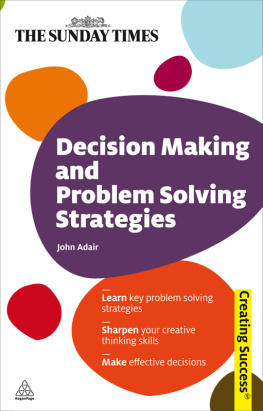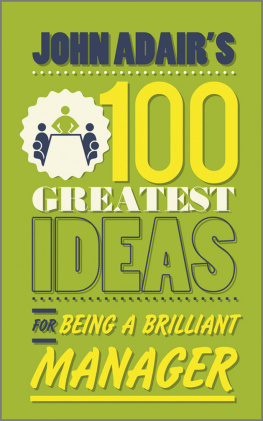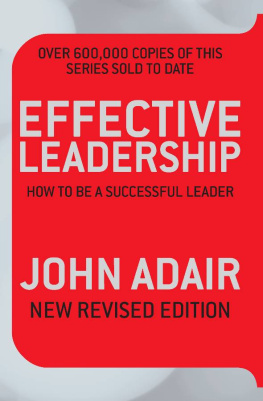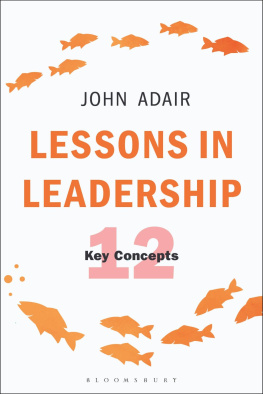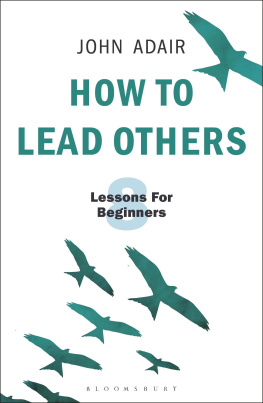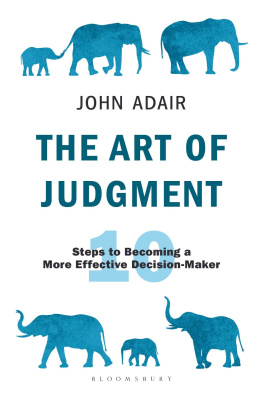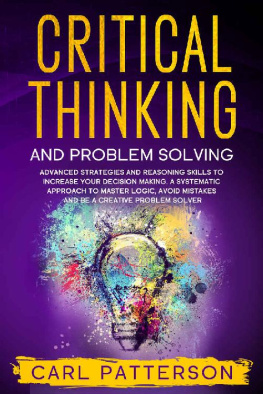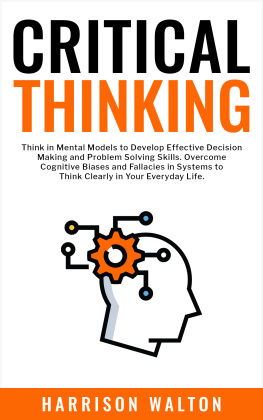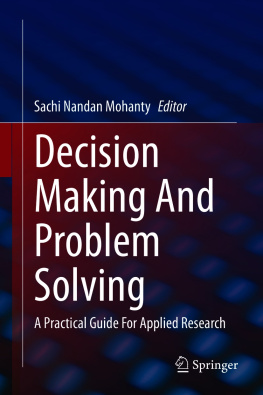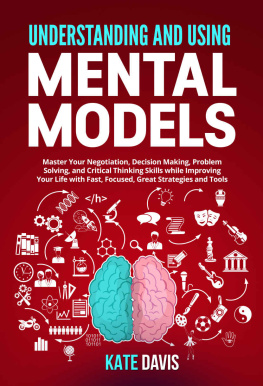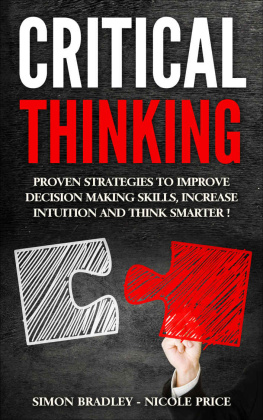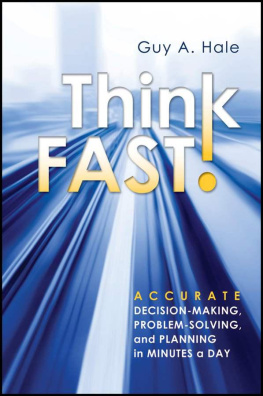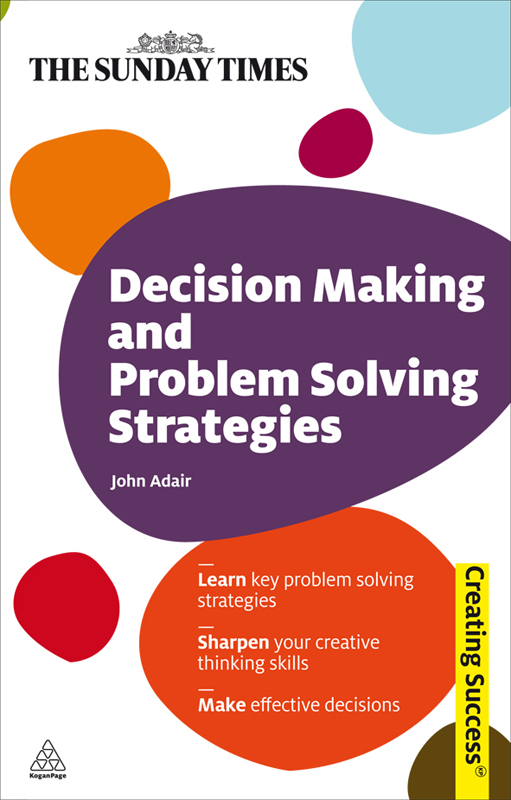
Decision Making
and
Problem Solving
Strategies
John Adair
Publishers note
Every possible effort has been made to ensure that the information contained in this book is accurate at the time of going to press, and the publishers and author cannot accept responsibility for any errors or omissions, however caused. No responsibility for loss or damage occasioned to any person acting, or refraining from action, as a result of the material in this publication can be accepted by the editor, the publisher or the author.
Previously published by the Institute of Personnel and Development as Decision Making and Problem Solving 1997 and 1999
First published in Great Britain and the United States in 2007 by Kogan Page Limited as Decision Making and Problem Solving Strategies
Reissued 2010
Apart from any fair dealing for the purposes of research or private study, or criticism or review, as permitted under the Copyright, Designs and Patents Act 1988, this publication may only be reproduced, stored or transmitted, in any form or by any means, with the prior permission in writing of the publishers, or in the case of reprographic reproduction in accordance with the terms and licences issued by the CLA. Enquiries concerning reproduction outside these terms should be sent to the publishers at the undermentioned addresses:
120 Pentonville Road | 525 South 4th Street, #241 | 4737/23 Ansari Road |
London N1 9JN | Philadelphia PA 19147 | Daryaganj |
United Kingdom | USA | New Delhi 110002 |
www.koganpage.com | India |
John Adair, 1997, 1999, 2007, 2010
The right of John Adair to be identified as the author of this work has been asserted by him in accordance with the Copyright, Designs and Patents Act 1988.
ISBN 978 0 7494 5551 4
E-ISBN 978 0 7494 5890 4
The views expressed in this book are those of the author, and are not necessarily the same as those of Times Newspapers Ltd.
British Library Cataloguing-in-Publication Data
A CIP record for this book is available from the British Library.
Library of Congress Cataloging-in-Publication Data
Adair, John.
Decision making and problem solving strategies / John Adair. -- 2nd. ed.
p. cm.
Originally published in 2007.
Includes index
ISBN 978-0-7494-5551-4 -- ISBN 978-0-7494-5890-4
(ebook) 1. Decision making. 2. Problem solving. 3. Thought and thinking. I. Title. II. Title: Decision making and problem solving strategies.
HD30.23.A3 2010
658.403--dc22
2009031517
Typeset by Jean Cussons Typesetting, Diss, Norfolk
Printed and bound in India by Replika Press Pvt Ltd
eBook by Graphicraft Limited, Hong Kong
Contents
John Adair is now widely regarded as the worlds leading authority on leadership and leadership development. The author of 30 books on the subject, he has been named as one of the 40 people worldwide who have contributed most to the development of management thought and practice.
Educated at St Pauls School, John Adair has enjoyed a varied and colourful career. He served as adjutant in a Bedouin regiment in the Arab Legion, worked as a deckhand on an Arctic trawler and had a spell as an orderly in a hospital operating theatre. After attending Cambridge University he became Senior Lecturer in Military History and Leadership Training Adviser at the Royal Military Academy, Sandhurst, before becoming the first Director of Studies at St Georges House in Windsor Castle and then Associate Director of the Industrial Society. Later he became the worlds first Professor in Leadership Studies at the University of Surrey. He also helped to found Europes first Centre for Leadership Studies at the University of Exeter.
John Adair now acts as a national and international adviser on leadership development. His recent books, published by Kogan Page, include Not Bosses But Leaders , The Inspirational Leader , How to Grow Leaders and Leadership and Motivation .
There are three forms of applied thinking that we all need: decision making, problem solving and creative thinking. These overlap considerably but they can be distinguished.
Decision making is about deciding what action to take; it usually involves choice between options. The object of problem solving is usually a solution, answer or conclusion. The outcome of creative thinking, by contrast, is new ideas.
Any leader such as yourself who aspires to excellence obviously has a vested interest in seeing that the best decisions are taken, that problems are solved in the optimum way and that the creative ideas and innovations so necessary for tomorrows business flow freely. Of course, everyone in the team or organisation should be engaged in meeting these essential requirements. But you are the one who is called to provide the intellectual leadership that is needed. Are you willing to do so?
One step towards that end that you should definitely take is to become master of the processes of practical thinking , the processes that lie behind all effective decision making, problem solving and creative thinking. You cannot guarantee outcomes for luck or chance plays a part in all human affairs but you can at least make sure that you use the well tried-and-tested processes of thinking to some purpose. You own that responsibility. For my part, the aim of this book is to equip you with the necessary knowledge of those processes and to help you to acquire skill in using them.
One further word. Forget the idea that thinking is somehow a painful and laborious feeling in the mind, a kind of headache that is best avoided if possible. Thinking is fun. By fun here I do not really mean a diversion that affords enjoyment. For the word also means an activity that engages ones interest or imagination, an activity that may prove to be more than a diversion and may involve challenge and hard work but is still a source of enjoyment. If you come to love thinking for yourself you will learn naturally to do it well.
As Roy Thompson, one of the greatest businessmen of our time, once said, If I have any advice to pass on, as a successful man, it is this: if one wants to be successful, one must think; one must think until it hurts. He added that, From my close observation, I can say that there are few people indeed who are prepared to perform this arduous and tiring work. Are you one of them?
In the following pages we shall explore some practical ways in which you can improve your skills in this key area. By the time you have worked through the book you should:
- understand the way in which the mind works and the principles of effective thinking;
- have a clear framework for decision making;
- be aware of the relation between decision making and problem solving;
- be able to use a unified model for both making decisions and solving problems;
- have sharpened up your creative thinking skills;
- be in a position to chart a way forwards for improving your thinking skills across the board.
Behind your practical, everyday thinking there lies the most complex thing in the known universe: the human mind. Nobody hires and pays you nowadays for your physical strength. You are employed because you have a mind and can use it effectively.

